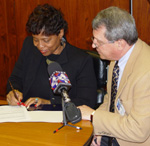MUSC meets fiscal minority spending goal
A $545,000 contract with a minority- and woman-owned conference management firm based in Columbia brought MUSC to its 12 percent goal for spending with minority vendors half- way into the fiscal year. Diane
Sumpter, president of DESA, signs a contract to provide conference management
services for an MUSC project. At right is Dr. John Sutusky, former vice
president for business and administration at MUSC, under whose tenure and
leadership the contract was negotiated.
Diane
Sumpter, president of DESA, signs a contract to provide conference management
services for an MUSC project. At right is Dr. John Sutusky, former vice
president for business and administration at MUSC, under whose tenure and
leadership the contract was negotiated.
During the past several years, the university has committed itself to meeting specified goals for directing controllable dollars towards minority vendors. In fiscal year 2001, only one-fourth of the goal was reached; in 2002 and 2003 the goal was surpassed.
The contract with minority- and woman-owned DESA not only helps the university to surpass its 2004 goal but also was likely a factor in the university’s successful bid for a $3.2 million federal contract.
Two years ago, the National Heart, Lung and Blood Institute named MUSC as one of the nation’s 10 proteomics centers. Along with this designation came $15.2 million in federal funds. Following the awarding of this contract, the university set its sights on becoming the coordinating center for the 10 national centers.
To this end, Peggy Schachte, director of the Office of Research Development, put together a competitive proposal for the contract entitled “National Heart Lung and Blood Institute Proteomics Initiative Administrative Center.” This would bring in an additional $3.2 million, and Schachte would serve as principal investigator on the project.
As the national coordinating center, MUSC would be responsible for all non-scientific aspects of the national proteomics program, which include setting up semiannual investigators’ meetings through 2009 as well as progress review panel meetings during the life of the contract.
Schachte said MUSC was well- equipped to handle the majority of the responsibilities involved. “Our one weak point, though, was our ability to plan and manage a myriad of logistical details involved with arrangements for these national meetings in Washington, D.C.,” she said. “We didn’t have the experience or staff to handle large group meetings in a remote location.”
She quickly recognized a solution to the problem in DESA, a company with extensive experience in handling large group meetings.
Recently she met Diane Sumpter, president of DESA. Schachte said she was very impressed with Sumpter and with the firm’s excellent reputation in the field. In writing the contract proposal to NIH, Schachte included DESA participation. Schachte felt that DESA brought to the project talents and skills that the Medical University lacked, and DESA's participation was a factor in the university’s success in winning the contract. She said that after evaluating technical and cost elements, the federal government gives additional consider-ation to inclusion of small, disadvant-aged and minority-owned businesses in making its final selection.
“We are very pleased with this contract,” said David Rivers, director of small business utilization and community outreach. “In 2002, we formed the MUSC Small and Minority-Owned Business Enterprise Advisory Group to advise the university on methods and tactics for increasing participation by small and minority business enterprises in the procurement activities of the university. One of their recommendations was collaborating with small and minority-owned business enterprises when competing for grants and contracts. Ms. Schachte has done this with tremendous success.”
The Medical University is also taking a leadership role in a spring
event to promote an increase in minority/small business contracts with
local agencies. Procurement officers representing federal, state, county
and local governments and other agencies will be on hand at a “one-stop
shopping” fair to facilitate the minority/small businesses’ becoming vendors
for their agencies.
Catalyst Online is published weekly, updated as
needed and improved from time to time by the MUSC Office of Public Relations
for the faculty, employees and students of the Medical University of South
Carolina. Catalyst Online editor, Kim Draughn, can be reached at 792-4107
or by email, catalyst@musc.edu. Editorial copy can be submitted to Catalyst
Online and to The Catalyst in print by fax, 792-6723, or by email to petersnd@musc.edu
or catalyst@musc.edu. To place an ad in The Catalyst hardcopy, call Community
Press at 849-1778.